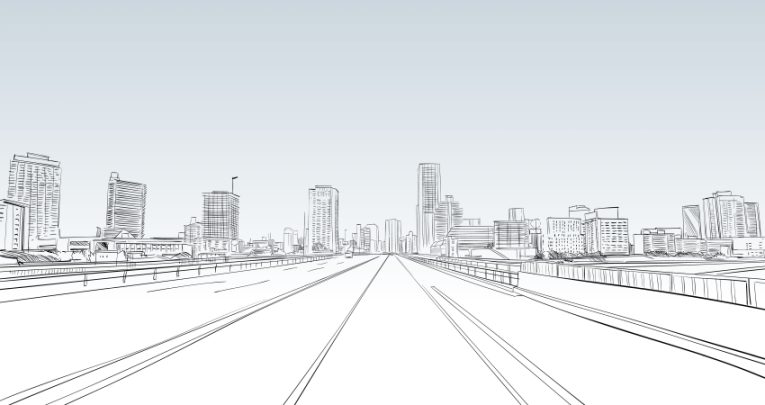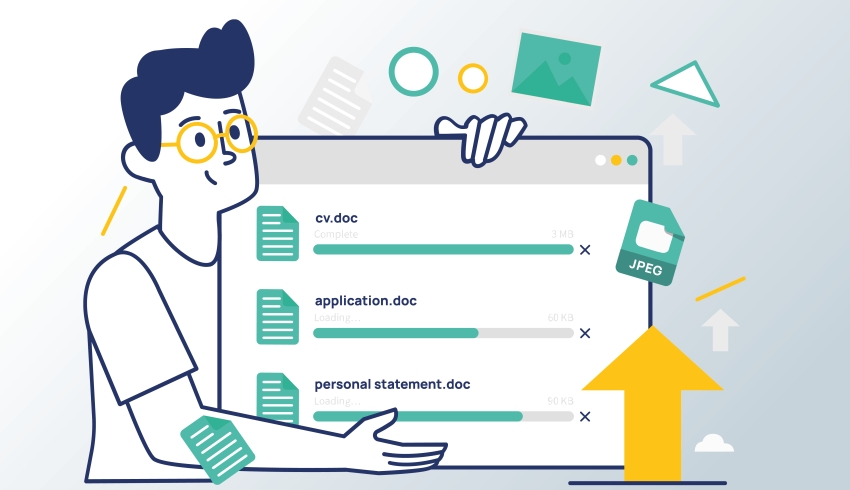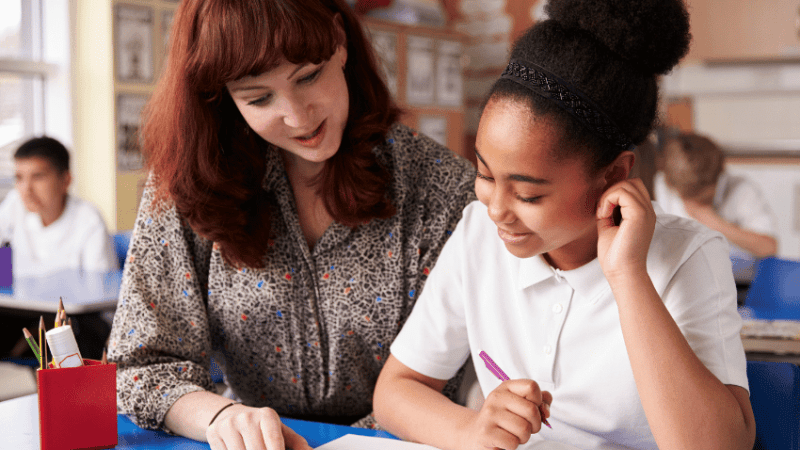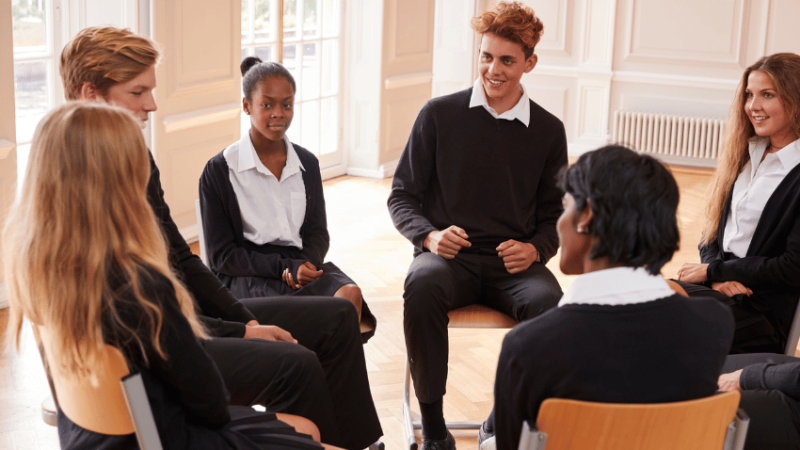Careers advice for students – Tools and tips for effective guidance

Practical advice and real-life case studies to help you support students with meaningful career guidance…

- by Teachwire
- Classroom expertise and free resources for teachers

Supporting students with career advice can be challenging, especially when they have diverse needs or uncertain ambitions. Here we explore practical strategies for career conversations in schools, along with a real-life case study showcasing effective careers guidance in action...
Jump to a section:
- Careers advice case study: St Martin’s School
- Helping neurodivergent students navigate the world of work
- Helping students whose ambitions are hazy
Careers advice case study: St Martin’s School
Careers and aspirations lead, Alex Frappell, explains how the careers advice offered to students at St Martin’s School in Brentwood starts early and builds over time…
I was appointed as my school’s careers and aspirations lead in January 2024. This entailed a huge learning curve. As a history teacher, it was a world that I didn’t previously know a great deal about.
One of my first priorities was to ensure that the school consistently met the Gatsby benchmarks. This became an Ofsted-mandated requirement for all schools from 2021.
Gatsby benchmarks are measured in percentages, based on schools’ completion of a termly assessment via a platform called Compass Plus.
Following our first such assessment in March 2024, some of our scores were as low as 11%. Using that assessment as a guide, we were at least able to identify where those critical gaps were, and work with outside agencies to ensure we attained scores of 100% across all eight benchmarks.
Opening eyes
My role is about opening students’ eyes to as many different career opportunities as possible, so that they can make more informed decisions.
A student’s dad may be a doctor; their mum might be a lawyer. They may well have some useful family connections within certain sectors, but that’s still their world.
There will be many other opportunities and possibilities that they know nothing about – some of which they might embrace. At the same time, they may find out about other career paths they conclude definitely aren’t for them.
Fitting in student career advice
In terms of setting aside time for careers advice, it’s been a case of trying to strike the right balance. I’m grateful that we have an excellent headteacher in place, who knows how important careers provision is to our broader curriculum goals.
There have been some occasions when I’ve asked for something, only to be told ‘not this week’ or ‘not this month’. But generally, when I’ve put forward the case for certain opportunities that will require taking students off-timetable, we’ve been able to come to an arrangement.
For example, we recently welcomed representatives from the Department for Work and Pensions (DWP). They hosted a series of one-hour workshops for our Y9s. Students got to learn about the local labour market, giving them an awareness of job opportunities across Essex and London they wouldn’t have known about otherwise.
So long as we plan such activities carefully throughout the academic year, we’re able to maintain that balance.
Some elements, like our careers advice assemblies, will be timetabled to take place before school. One thing we’re looking at possibly introducing is Y11 careers breakfasts. This will involve local employers visiting school from 8am until 8:45am, to discuss particular jobs and sectors that our Y11 students might interested in finding out more about.
Progress made
In November 2024, we launched a new work experience scheme. It saw our Y10s participate in two-hour CV workshops, again led by DWP representatives.
They came away with CVs created using a DWP template designed to be ‘AI-proof’, which listed key skills and keywords that the representatives knew employers are looking for.
In January this year, those CVs were then used as part of a ‘mock interview’ activity. This involved a number of local employers.
They volunteered their time across two days help us organise 30-minute mock job interviews. We gave them some guided questions to put to our students, while assessing the CV prepared by the student sat before them.
The employers were tasked with being adaptable and creative with their questions for the activity. This served to familiarise our students with what a formal interview situation looks and feels like. It also gave students a chance to put some questions of their own to the interviewers.
The students then received feedback on their interview performance and CVs. They’ll use this to further develop their CVs ahead of securing work experience placements in the summer.
Meaningful encounters
To help us reach out to local companies, we received some assistance from the national Careers and Enterprise Company (CEC) and its Greater Essex local branch.
We’ve also taken part in CEC’s termly networking meetings. These feature speakers from local education settings and businesses. They put forward various ideas and partnering opportunities, some of which we’ll then follow up on later.
The Greater Essex CEC has also assigned us a school link colleague. They have helped me bolster our local networking by identifying companies and local bodies who may be willing to work with us. Otherwise, our outreach efforts have been largely done through word of mouth.
Careers and Aspirations Week
Our biggest school activity is Careers and Aspirations Week, which takes place in July. The main school timetable is collapsed, so that we can dedicate five hours each day across that week to a different form of careers advice activity for all year groups.
This year, one of those days will be set aside for a ‘take your child to work’ initiative for Y7 to Y9, where a parent, other relative or trusted family friend will take the student to their place of work for the day.
Previously, we’ve also put on an enterprise activity, where students were tasked with suggesting ways in which companies could operate in a more environmentally friendly way.
For students showing early signs of being entrepreneurial, we’ve organised activities based around showing them what it’s like to set up their own business and become self-employed.
Our plans for this year’s events include setting aside an hour for Y7, in which they’ll have the chance to meet with four different employers for up to 15 minutes via a carousel system.
They’ll get to hear about the employer’s job, find out what they actually do and ask some follow-up questions.
We want to encourage more of these meaningful encounters over time, help our students develop employment skills right from Y7 – and ultimately encourage them all to pursue their dreams however we can.
Alex Frappell is a history teacher and Careers and Aspirations Lead at St Martin’s School, Brentwood.
Helping neurodivergent students navigate the world of work

Debby Elley highlights the steps teachers and careers advisors can take when helping neurodivergent students enter the world of further study and work…
According to the Office for National Statistics, 71% of autistic people are not in work. Let’s imagine what it would be like for over three-quarters of the non-autistic population to be unemployed. What would the impact of that be, both for them personally and for society as a whole?
At the moment, we’re casually discarding the economic potential of an entire demographic. Careers advisors need to be passionate about helping to redress this balance. This is not just for autistic students, but for the neurodivergent cohort as a whole.
Yes, there’s much to be done when it comes to educating employers. However, working with youngsters early on to address their distinct needs will be of considerable help.
1. Know your student
Before you provide any kind of careers support to students with autism, have conversations with your school’s SENCo and students’ form tutors. Don’t overlook parents and carers either. They’ll be invaluable in helping you to form a good picture of the sort of help required.
Ask the pupil how they would prefer their advice sessions to be run. I’m aware of one careers advisor who positions chairs so that autistic pupils can look out of the window and keeps fidget items on her desk.
She also offers a ‘walking and talking’ option. Here, the lack of face-to-face contact, combined with movement, can stimulate real discussion. With autistic pupils, providing them with choices can help give a sense of control and reduce anxiety.
2. Draw up a contract
Some youngsters are used to feigning knowledge in order to avoid feeling foolish. To begin with, make an informal contract to establish trust.
Explain that you don’t expect them to know much about what they haven’t yet experienced, that no question is too silly to ask, and that they can be honest about their hopes and fears for the future, including any perceived obstacles. In return, you’ll be able to help them plan some meaningful steps forward.
3. Adopt a non-threatening approach
Non-threatening approaches clear the way for students to admit to gaps in their knowledge. ‘Do you know what a CV is?’ is rather confrontational.
Instead, use softer approaches that avoid sounding like tests. Say, ‘Lots of people think they might know what a CV is, but they aren’t quite sure…’
Admitting your own fallibility can sometimes help, too. For instance, ‘When I was younger, I hadn’t got a clue about…’
Never assume that a student will already aware of why something may be important. Instead, present the reasons for it to be.
Using the same gentle approach, you can have discussions that would otherwise be challenging to process. This will help them acquire key knowledge they may be missing.
4. ‘Here’s one I did earlier…’
Your autistic students may not be aware of the best language and approach to use when writing a CV or attending an interview. Doing either of those things requires them to imagine how they will come across from the perspective of a third party; a form of ‘3D thinking’ that may be a fundamental challenge for them.
Solid visuals work far better than abstract concepts, so create some example CVs that incorporate their hobbies and dreams and really go to town on imagining what a poorly presented CV might look like, so that they know what to avoid. Make it fun!
To help them understand the purpose behind self-presentation, you could ask them to watch a favourite TV advert while observing how key messages are used to engage potential buyers.
- Apps for Good has launched new Career Series videos for students and school leaders. The free, bite-sized sessions connect schools with real-world professionals who can offer valuable insights and guidance.
Sessions include behind-the-scenes details from staff at Spotify and Lego; the essential skills that employers want; ‘squiggly’ career paths; and creative careers in a digital age.
5. Use concrete tools
Many pupils with SEND can find abstract concepts difficult, and will struggle to retain auditory information – particularly when the topic is unfamiliar.
Some careers-related topics can be effectively explored through the use of card games, either individually or as a group. Rather than just talking about the steps needed to secure work experience placements, for instance, you could write each step on a card and ask pupils to decide in which order they should be tackled. For youngsters who struggle to plan tasks systematically, this kind of exercise can be especially beneficial.
The same technique can also be used when analysing a student’s priorities. Starting with a hierarchy of needs defined by them, write each one on a card and then place them on a surface to rate them from, say, 1 to 5. Via this method, you can help a young person form a better idea of what to focus on when searching for work, and areas where they could perhaps compromise if needed.
Other ways of working could include making ‘like’ and a ‘dislike’ card piles for various work-related tasks, or using ‘true’ or ‘false’ questions to gauge environmental workplace preferences. Simple binary choices are less challenging than open-ended discussions.
6. Learn how to learn
It’s worth investing some time in teaching skills related to researching jobs, and showing students how to find out more about certain aspects of a role that may be important to them.
Avoid making assumptions about what kinds of careers may be suitable for them. A common misconception is that people with autism lack imagination, which can sometimes discourage interest in the creative industries, but it’s simply not the case.
7. Tackle the big unknowns
For most students, the unknown future can be intimidating. For neurodivergent students, this wariness can become all-consuming. How do you plan for a future you can’t picture? What if a job ends up involving too much pressure?
Careers advisors can’t pretend this isn’t the case, so they need to work with it. Arranging for students to talk with neurodivergent young adults – maybe even past pupils – currently in work or studying at university can be extremely reassuring.
The law protects disabled people at work, which students should be made aware of. At the same time, however, the ability to self-advocate in a way that preserves workplace harmony is a skill that can’t be underestimated. Ask students to think about how they might express their own needs, and have them practise doing so within the school environment.
Just as they did when first starting secondary school, pupils will need clarity as to who can help them in the workplace if they require adjustments, and how to go about approaching them.
Successful work experience placements can be a real confidence boost, but they need to be carefully planned and supported and incorporate predictable routines.
Try connecting with local workplaces that youngsters might already have positive associations with, and remember that hours of work experience, rather than days, will give them time to recover from the novel experiences they’ll have had.
Local organisations that help disabled people into work may be able to provide free work experience support for those with EHCPs, too, though these will generally require a social worker’s referral, so it’s best to start planning early.
8. Help them expand on their ideas
Literal thinkers can benefit greatly from help with expanding their ideas on how they can use their skills.
For example, some youngsters might fixate on being a ‘games tester’, because that’s the only job they know of that relates to their favourite hobby. Testing is, of course, a skill that can be used outside of the gaming industry in multiple occupations. And if games is your thing, there are naturally hundreds of other roles in that industry besides being a tester.
Once you’ve managed to identify what your pupil sees as obstacles, you can suggest ways for how these might be overcome. The increased adoption of hybrid working in recent years presents many opportunities for those who might prefer to work within their own home environment.
More than anything else, looking at job descriptions, visiting workplaces and observing people at work will be invaluable. The more concrete an idea can be, the easier it then becomes for students to picture themselves in that position.
What about further education?
- Families should consider selecting a further education college with smaller class sizes in preparation for higher education
- Universities now often have dedicated departments that will support students with disabilities during initial tours and throughout their time as undergraduates
- Visiting students should have opportunities to sit in on relevant classes during open days
- The Disabled Students’ Allowance can make a huge difference at university; a team will assess a student’s needs in depth and can provide mentoring and tutoring support, as well as a range of learning and planning apps
Debby Elley is the co-founder of AuKids magazine and co-author, with Gareth D. Morewood, of Championing Your Autistic Teen at Secondary School; her new book, Just the Job! – A Light-Hearted Guide to Office Life for the Autistic Employee, co-authored with Maura Campbell, is out in June 2024, published by Jessica Kingsley.
Helping students whose ambitions are hazy
Schools will support students in embarking on their preferred career path – but what can they do when students’ ambitions are still hazy? Dr Helmut Schuster and David Oxley investigate…
We recently had the privilege of discussing careers and future work trends with 300 high schoolers in Vienna.
Despite them having spent most of their lives in an idyllic suburb of the city, the audience was surprisingly well-informed about world events. Indeed, they demonstrated great passion around issues such as climate, justice, equality, and fairness.
At the same time, however, they were naïve about the world of business, anxious regarding their prospects for a good career and worried about meeting lofty expectations.
Understand your starting point
We began our careers advice for students by presenting some context. One of the most important ingredients for a successful career is to think through how current trends concerning economic, political and social change are likely to influence the future of work, so we set out the following four key observations:
The speed of life and pace of change are accelerating
Some time ago, we attended a conference hosted by BP for some of its most senior leaders. After stepping on stage, the event’s keynote speaker slowly scanned the room before calmly remarking, ‘Note this moment – this will be slowest day of the rest of your life.’
We live in an increasingly digital world characterised by an ever-accelerating pace of change, but rather than fighting it we should embrace it. Workplace processes are no longer linear, but now encompass ‘everything, everywhere, all at once.’ Negative judgments around the pervasiveness of multitasking and the ‘invasive’ nature of social media are wide of the mark. Generation Z has intuitively figured this out for themselves – much to the disapproval of their parents.
Sources of learning are now much more diverse
It’s the most amazing experience to talk to a waiter in a remote peninsula of Colombia about Kafka’s Metamorphosis, but that’s how the world operates these days. Some people might not have fresh water or individual showers, but they do have smartphones that enable access to the cumulative wisdom of all humanity. Education has been democratised. This single reality will change the world.
New careers and income opportunities are emerging all the time
A young serial entrepreneur recently complained to us that you can earn a better living nowadays as a Tik-Tok influencer, worrying aloud about whether business ownership, with all its stresses and responsibilities, was ultimately worth it. The truth, however, is that doing anything well requires perseverance, sacrifice and dedication. When something’s done well, it only appears easy to those looking on.
He also pointed out the diversity of career choices that had been available to him, compared to now. 50 years ago, many would race to secure places on the best corporate graduate programs. Today, most of the college graduates we talk to are seeking introductions to venture capital firms. Young people shouldn’t limit their ambitions to just the traditional corporate career paths of old.
The concepts of a global mindset and global citizenship have become more mainstream
Have you noticed how many shows on Netflix are set in Asian, European or Latin American countries? It’s indicative of how now, more than ever, people are familiar and happy to engage with diverse ways of living, customs, traditions, and attitudes from around the globe.
There’s a collective appreciation that in many ways, life as teen in Korea, Colombia, Mexico or Nigeria isn’t all that different to what it’s like in the West. There are still pressures around fitting in; parents who don’t understand you; sudden swings between feelings of helplessness and invincibility. Moreover, it’s about first love, and often about acquiring less binary views of identity and sexuality.
Stoking the imagination
Against this backdrop, we recognise the eternal challenges awaiting people starting out on their careers. The transition from school to professional life presents the daunting prospect of having to personally reinvent yourself. We should never underestimate just how hard it can be for students to leap from the comfortable routine of full-time education into the scary unknown world of business.
Consequently, we have designed three exercises to help students embrace the contemporary context, while demystifying the world of business.
Exercise 1: The MACRO – Cause and Contribution
We want to encourage engagement on consequential issues. The idea here is to ask students to scan newspapers, internet sources and information from their local community to identify those problems they feel are most in need of attention – whether they be global, local, collective or individual issues. We then ask them to suggest a contribution they can imagine making, however modest, towards solving the problem.
- Ask students to maintain a weekly journal
- Have them create two columns, headed ‘Cause’ and ‘Contribution’
- Give them an opportunity each week to explain and receive feedback on their journal entries
This exercise can be undertaken over a month or a much longer period. Its power lies in creating an iterative process of discovery between students’ identification of issues, and subsequent debates with their classmates, teachers, or even an outside business mentor as to how they might be able to refine their ideas.
Desired Outcome: Creating a list of potential career destinations and points of entry
Exercise 2: The MICRO – Trying things on for size
We can often overlook what opportunities there are for students to undertake careers activities now, in parallel with their schoolwork. Those who find the transition from school to professional life the easiest tend to be those who didn’t wait for a starting gun.
Challenge your students to complete ONE of the following tasks over a 3- to 6-month period:
- Volunteer for an NGO
- Participate in a scholastic business plan competition
- Pursue a job shadowing placement in a profession of interest
- Solve a business problem for their family
It’s essential that this exercise be carefully supervised to ensure oversight through the selection, participation and any post-completion closure.
Desired Outcome: A reinforcing of the power to be had in doing things in parallel, and development of resilience in response to the often mundane realities of work
Exercise 3: The PRACTICAL – How do you find and evaluate jobs?
The single biggest assumption we would seek to challenge when it comes to careers advice for students is that the process of finding a job is somehow intuitive and easy. It isn’t, and it’s not.
Consequently, the one crucial exercise we recommend for all students is to help them understand how to use the following sources to identify and then pursue potential job opportunities. The assignment can be to set aside a week to review and explore each possibility in a classroom setting, or to ask students to form teams and research one source each, before giving a class presentation.
- LinkedIn: Increasingly the most powerful online marketplace for jobs, self-promotion and networking
- Professional networks: All major professions have organisations with programs designed to help kids start careers
- Youth development NGOs: We have worked with the AFS Youth Assembly, but there are others. These organisations provide incredible opportunities for scholarships, networking and work experience.
- Apprenticeship programs: Major government-supported programs that are focused on helping students launch their careers
- Personal networking: Often, the best career opportunities will emerge from inspirations and connections we already have; helping students to identify them and overcome any hesitation in accessing them is hugely important
Desired outcome: Demystify the process of identifying job opportunities and accessing them
Dr Helmut Schuster is the former Group HR Director of BP PLC; David Oxley is a management consultant and specialist in organisational change; their co-authored book, A Career Carol: A Tale of Professional Nightmares and How to Navigate Them (£8.99, Austin Macauley Publishers), is available now










